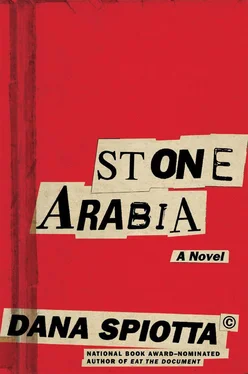But I knew this was not even true. I knew other horrors awaited. I knew that just as I was starting to fall apart right in front of my mother, just as I knew my mother must note my sad middle-aged visage, I knew I would live long enough to see Ada start to grow old. Already when I see her I notice how she looks more tired in tiny ways. I would live to see her get crow’s-feet and gray hair and hands that showed veins. I would see her feet and her neck change. I would see the perfection of her body be undone by time. I might live to see her lonely, divorced, unhappy, and a hundred other disappointments. What you don’t think about or plan for (as if that helps) is watching your children get old. The privilege of a long life is you live long enough to see your perfect child also submit to time and aging.
So, on my forty-seventh birthday — if that was truly my middle age — what did the second half of my life hold for me? I would watch my mother and her friends and siblings die, one by one, but also all at once, a flurry of funerals, then watch my brother and my friends as they speedily replaced them as failing beings on the way out. Everyone knows that is just how it goes. I’m not the only one, right? And let’s not forget I get to experience my own dwindling vitality, which will surely accelerate and reach critical mass in the next fifteen years.
I stood in my mother’s doorway and scanned the room. Soon she would have to move from this apartment — it went in-home aide to assisted living to a full-care facility to a hospice. I was just waiting for the thing to reach the next level. Whenever I visited, I was vigilant in looking for signs of new deterioration. Was she wearing pajamas in the afternoon? Did she smell clean? I expected to find rotten food in the refrigerator, a carton of old milk congealing in the cupboard. But her routine — and I made sure it was always the same for her — could stay intact for the moment. I checked in with her most mornings, and her home health aide came in the afternoon to help her with dinner. Once a week we went shopping and had lunch together. She appeared to hold at this point, but I couldn’t stay where she was — I waited and watched for what came next.
I think on some level I always imagined Nik would never make it into old age, how could he? He didn’t make those kinds of mistakes. I knew he would die of cigarettes and drinking long before I would finally die. I just got to witness and witness and stupidly survive. The second half of my life was just the bill due for the pleasures of the first half. And Nik would get to escape payment.
I left her apartment, sniffling and congested with my little birthday pirouettes around mortality. A fitting birthday disposition, but then I began to fixate on how I had managed to forget that birthday cake. I realized I couldn’t actually locate it in my memory. I could remember only the photograph we took of the cake. Not the feel of the pink-and-white frosting in my mouth, not the gulp of cold milk I no doubt drank after a few bites. Oh sure, I could conjure a sweet cake-taste memory, but that was a generic substitute, a little made-up game. All that remains is a photo of that cake, somewhere, in some album. It does not help, having a photo. I believe — I know — that photos have destroyed our memories. Every time we take a photograph, we forget to embed things in our minds, in our actual brain cells. The taking of the photograph gets us off the hook, in a way, from trying to remember. I’ll take a photo so I can remember this moment. But what you are really doing is leaving it out of your brain’s jurisdiction and relying on Polaroids, Kodak paper, little disintegrating squares glued in albums. Easily lost or neglected in a box in your waterlogged garage. Or you bury it in some huge digital file, waiting to be clicked open. All you have done is postponed the looking, and so the actual engaging, until all you are left with is this second-generation memory, a memory of an event that is truly only a memory of a photograph of the event. It is not a real, deep memory. It is a fake, fleeting one, and your mind can’t even tell the difference.
These very ordinary memory failings gathered weight and had grown into a quiet but desperate obsession over the last few months. I started to take note of them right after we finally got my mother’s official diagnosis.
The official diagnosis:
Her doctor said she had age-related cognitive decline, also called mild cognitive impairment, very common for a person in her seventies, and that this was no longer called senility, which really just means oldness. Eventually it would probably become mild dementia and then full-blown dementia, which is a kind of scary-sounding word that simply means the mind is going away. So you have to specify age-related dementia instead of, say, drug-induced dementia. My mother exhibited significant early symptoms of age-related dementia including but not limited to advancing episodic memory impairment and disorientation. Very commonplace, he said, which was supposed to be a comfort. When pressed, he also remarked that her decline was most certainly progressive. But everything was progressive, clearly. Did we actually think our memory had any stasis? That it wasn’t constantly melting away?
After that, I began to find her troubling to be around for all the obvious, emotional reasons. But I also had a growing worry that her lapses were somehow contagious. I had no rational basis for this anxiety — clearly her brain was distinct from my own brain. I also knew I was probably avoiding a more frightening mortal anxiety by substituting a slightly more manageable one. But.
The traffic was gone now. I still had a forty-five-minute commute to work. I didn’t have the heart to listen to the memory book, the self-help book. I pretended I had bought the stupid book to help my mother, but I knew I was really buying it to appease my paranoia about my own mental deterioration. Maybe just owning it would be enough and I wouldn’t actually have to listen to it.
Then, out of nowhere, randomly, I had a memory crisis, a mental meltdown over a seemingly insignificant piece of information that I tried to recall. I don’t know what led me to try and retrieve this particular piece of trivia (because I don’t remember!), but there I was, floundering as I drove, sweating even, chewing hard on a herbal, soon-to-be-flavorless piece of gum. This sort of memory slip was all too typical of my brain these days.
Sometimes basic words of familiar vocabulary hid behind missing letters. I would run through the alphabet, hoping I would get the right sound by process of elimination. More often, a name I knew refused to come to me. I constantly had the sense of information on the verge, precision at the margin, vision just beyond the frame. Not like Mom, not not remembering what I was trying to remember, this was not remembering what I sort of nearly recalled. It was like a glitch, like a scratch on a record. I even hit my head occasionally to get the needle to jump to the next place. I knew, somehow, moving forward was often the best way to remember what came before. Looking at a thing directly didn’t work. I also knew trying so hard just caused surges of stress-induced cortisol to shut down my hippocampus, sealing off access to my long-term memory. Still.
This time I was trying to think of a movie actress’s name. I came up with Mamie Van Doren. And I knew that was not who I was trying to think of. I was trying to think of another blond actress, one much more famous than Mamie Van Doren. I thought about her, this actress with the out-of-reach name, and how she was decapitated in a tragic Cadillac accident. I thought of her famous custom-made heart-shaped swimming pool. Yes, anyone would have it now, but not me. Marilyn Monroe was at the other end of the bombshell spectrum, this actress was ersatz Marilyn, and Mamie Van Doren was ersatz her, ersatz ——. I saw her face, her little nose, her chalky pink lips, her enormous breasts. (Enormous in the old way, fleshy mounds that attached to the whole chest, Anita Ekberg oceanic flesh that might drown a man, instead of the modern-style augmented, separate, too-high globes with the huge lonely valley between them, carved breasts that seem to exist almost in a different world from the body they are attached to. But how could I assess the pertinent advantages of real versus fake enormous breasts? Maybe men like that hard valley, maybe they like the delineated order of the implanted, artificial breast.) I could not think of her name.
Читать дальше












